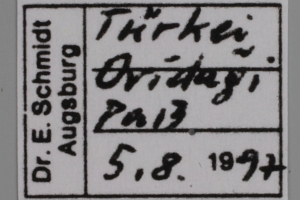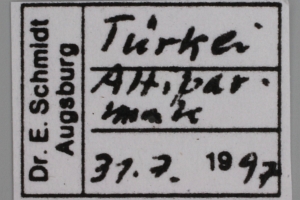

 +2Kontinente:AS
+2Kontinente:AS2. Diagnose
2.1. Männchen
2.2. Weibchen
2.3. Erstbeschreibung
3. Weitere Informationen
3.1. Andere Kombinationen
- Erebia tyndarus f. graucasica Jachontov, 1909 [Originalkombination]
- Erebia tyndarus ssp. graucasica Jachontov, 1909 [so bei Warren (1935)]
- Erebia iranica ssp. graucasica Jachontov, 1909 [so bei Lukhtanov et al. (2019)]
3.2. Synonyme
- Erebia hippocoon Niesiolowski, 1937
- Erebia caucasica Korshunov, Antonova & Kotshetova, 1984
3.3. Faunistik
Nach [Global Biodiversity Information Facility] kommt die Art in Türkei, Georgien, Russland, Iran und Armenien vor. Doch so kann das nicht stehen bleiben!
Locus typicus gemäß Erstbeschreibung ist der Mt. Kazbek im Nordkaukasus in Georgien an der Grenze zu Daghestan (Russland). Warren (1935) meldet das gemeinsame Vorkommen von Erebia graucasica [als Erebia tyndarus ssp. graucasica] und Erebia sheljuzhkoi [als Erebia callias ssp. sheljuzhkoi] am Mt. Chatipara im westlichen Nordkaukasus von Daghestan. Lukhtanov et al. (2019) bestätigen das gemeinsame Vorkommen der beiden Taxa im Nordkaukasus. Demnach sind aber die Angaben aus Armenien, der Türkei und dem Iran falsch. Sie beruhen auf Meldungen zu "Erebia graucasica transcaucasica Warren, 1950" bzw. "Erebia graucasica savalanica De Lesse, 1956", die heute als Erebia iranica ssp. transcaucasica (mit Taxon savalanica als Synonym) geführt werden.
(Autoren: Erwin Rennwald & Michel Kettner)
3.4. Literatur
- Erstbeschreibung: Яхонтовъ, А. А. (1909): Замътки о кавказскихъ Lepidoptera-Rhopalocera. — Русское энтомологическое обозръние 8 (3-4): 282-292.
- Lukhtanov, V., Sourakov, A., Tikhonov, V. & E. Zakharov (2019): Taxonomic Rearrangement of the Erebia tyndarus Species Group (Lepidoptera, Nymphalidae, Satyrinae) Based on an Analysis of COI Barcodes, Morphology, and Geographic Distribution. — Folia Biologica (Kraków), 67 (4): 149-157. https://doi.org/10.3409/fb_67-4.15. [zur Arbeit mit PDF-Download auf researchgate.net]
- Warren, B.C.S. (1935): Notes on a new subspecies of Erebia callias. — The entomologist's record and journal of variation, 47 (1): 3-4. [Digitalisat auf biodiversitylibrary.org]












